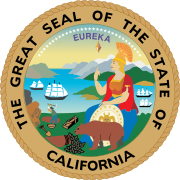- California Proposition 83 (2006)
-
Elections in California 
Constitutional officers Gubernatorial elections 1861 · 1906 · 1910 · 1914 · 1918 · 1922
1926 · 1930 · 1934 · 1938 · 1942 · 1946
1950 · 1954 · 1958 · 1962 · 1966 · 1970
1974 · 1978 · 1982 · 1986 · 1990 · 1994
1998 · 2002 · 2003 (recall) · 2006 · 2010Lieutenant governor elections Secretary of State elections Controller elections Treasurer elections Attorney General elections Insurance Comm. elections SPI elections Legislature State Assembly elections 1992 · 1994 · 1996 · 1998 · 2000 · 2002
2004 · 2006 · 2008 · 2010 · SpecialState Senate elections 1992 · 1994 · 1996 · 1998 · 2000 · 2002
2004 · 2006 · 2008 · 2010 · SpecialJudicial Propositions Full list 1910-1919 1911 4 · 7 · 8
1960-1969 1963 14
1970-1979 1972 11 · 17
1978 8 · 13 · Briggs Initiative
1980-1989 1982 8
1986 1988 1990-1999 1996 1998 6 · 10 · 227
2000-2009 2000 2003 2004 1A · 55 · 56 · 57 · 58 · 59 · 60 · 60A · 61
62 · 63 · 64 · 65 · 66 · 69 · 712005 2006 2008 91 · 92 · 93 · 94, 95, 96, and 97 · 98 and 99
1A · 2 · 3 · 4 · 5 · 6 · 7 · 8 · 9 · 10 · 11 · 122009 13 · 1A · 1B · 1C · 1D · 1E · 1F
2010-2019 2010 13 · 14 · 15 · 16 · 17 · 19 · 20 · 21 · 22 · 23
24 · 25 · 26 · 27Elections by year State elections Nov 1992 · Nov 1994 · Nov 1996 · Nov 1998
Nov 2000 · Nov 2002 · Nov 2004 · Nov 2005
Nov 2006 · Feb 2008 · Jun 2008 · Nov 2008
May 2009 · Jun 2010 · Nov 2010 · Nov 2012Primary elections 2000: Democratic · Republican
2004: Democratic · Republican
2008: Democratic · RepublicanLos Angeles Mayoral elections City Attorney elections 2009
San Diego Mayoral elections 2012
San Francisco Mayoral elections 1975 · 1979 · 1983 · 1987 · 1991 · 1995
1999 · 2003 · 2007 · 2011Board of Supervisors elections General elections Mar 2004 · Nov 2004 · Nov 2005 · Jun 2006
Nov 2006 · Nov 2007 · Feb 2008 · Jun 2008
Nov 2008 · Nov 2009 · Jun 2010 · Nov 2010
Nov 2011Proposition 83 of 2006 (also known as the Sexual Predator Punishment and Control Act: Jessica's Law or simply, Jessica's Law) was a statute enacted by 70% of California voters on November 7, 2006, authored by State Senator George Runner (R-Antelope Valley) and State Assemblywoman Sharon Runner (R-Antelope Valley). It was proposed by means of the initiative process as a version of the Jessica's Law proposals that had been considered in other states.
Contents
Provisions
The Act was a lengthy and complex measure that made many changes to the California Penal Code and the Welfare and Institutions Code. Its provisions increased the penalties for sex offenders, broadened the definition of certain sexual offenses, eliminated good time credits for early release of certain offenders, prohibited probation for certain crimes, extended parole for some offenses, increased court-imposed fees on sex offenders and provided for lifelong GPS monitoring of high risk sex offenders. The law also bars convicted sex offenders from living within 2,000 feet of a school or any place where children gather—effectively blocking them from living in the vast majority of the areas of large California cities. Under the new law, a sex offender with a minimum of one victim and any previous criminal history may be civilly committed for an indefinite period.[1]
Initiative campaign
The law was sponsored by husband and wife legislators State Senator George Runner (R-Antelope Valley) and State Assemblywoman Sharon Runner (R-Antelope Valley). It was supported by Governor Schwarzenegger and law enforcement throughout the state. California Attorneys for Criminal Justice (a criminal defense attorneys association) opposed Proposition 83 and wrote the opposing argument for the voter pamphlet. They argued the restrictions would cause problems with finding a place of residence for freed convicts.[2]
Result of vote
Proposition 83[3] Choice Votes Percentage  Yes
Yes5,926,800 70.5% No 2,483,597 29.5% Total votes 8,410,397 100.00% Enforcement
In November 2006, enforcement of the new law was initially blocked in four counties by U.S. District Judge Susan Illston who ruled in a lawsuit filed by an existing offender based on its retroactive nature.[4] However, three months later, U.S. District Judge Jeffrey White dismissed that lawsuit.[5] In 2010, the Supreme Court of California ruled that the residency requirements of Jessica's Law could be applied retroactively.[6]
The California Department of Corrections and Rehabilitation (CDCR) has stated that every registered sex offender paroled after the law's passage in 2006 is wearing a GPS device.[7] However, CDCR is responsible for only 11% of California's sex offenders statewide,[7] and "only a fraction of the state's registered sex offenders wear a GPS unit".[8]
References
- ^ http://forensicpsychologist.blogspot.com/2007/11/california-new-ruling-upholds.html
- ^ Arguments supporting and opposing Proposition 83
- ^ "Proposition 83: Sex Offender Reform" (PDF). California Secretary of State. 2006-12-14. http://vote2006.sos.ca.gov/Returns/prop/mapR083.htm.
- ^ Prop. 83 buffer zone for sex criminals blocked November 9, 2006
- ^ Jennifer Warren (February 24, 2007). "Prop. 83 rulings leave a gray area". Los Angeles Times: p. 2. http://articles.latimes.com/2007/feb/24/local/me-offenders24/2.
- ^ Maura Dolan (February 1, 2010). "'Jessica's Law' can be applied retroactively, state Supreme Court decides". Los Angeles Times. http://latimesblogs.latimes.com/lanow/2010/02/jessicas-law-can-be-applied-retroactively-state-supreme-court-decides.html.
- ^ a b "Sex Offender Information". California Department of Corrections and Rehabilitation. http://www.cdcr.ca.gov/Parole/Sex_offender_facts/index.html.
- ^ GPS monitoring of sex offenders is useful, but limited, experts say
External links
Categories:- California ballot propositions, 2006
- Sex laws
- Sex offender registration
Wikimedia Foundation. 2010.
